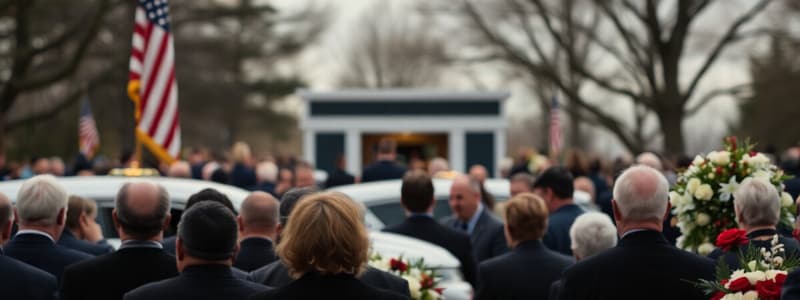Podcast
Questions and Answers
According to Turner and Edgley, how do American funerals function within a sociological framework?
According to Turner and Edgley, how do American funerals function within a sociological framework?
- As meticulously staged performances designed to manage emotions, reinforce social order, and uphold cultural beliefs about death. (correct)
- As unstructured ceremonies that prioritize individual mourning over collective social norms.
- As spontaneous gatherings primarily driven by individual grief and emotional expression.
- As informal events that reflect the unique personal preferences and values of the deceased.
In the context of funerals as 'theatrical performances,' what role do items such as caskets, flowers, and black attire primarily serve?
In the context of funerals as 'theatrical performances,' what role do items such as caskets, flowers, and black attire primarily serve?
- They are mainly practical necessities, with little symbolic or emotional significance.
- They act as essential props that enhance the emotional and symbolic meaning of the event. (correct)
- They function primarily as aesthetic enhancements aimed at creating a visually appealing environment.
- They serve to distract mourners from their grief, providing a temporary escape from emotional pain.
What is the primary role of funeral directors in the 'theatrical performance' of American funerals?
What is the primary role of funeral directors in the 'theatrical performance' of American funerals?
- To act as primary grievers, expressing the most profound emotions on behalf of the bereaved.
- To serve as detached observers who ensure legal requirements are met.
- To act as 'stage managers,' coordinating logistics, guiding mourners, and shaping the emotional tone of the ceremony. (correct)
- To serve as historians, documenting the life of the deceased for posterity.
What does the concept of 'deathwork' refer to in the context of American funerals?
What does the concept of 'deathwork' refer to in the context of American funerals?
How do symbols and rituals contribute to the grieving process during American funerals?
How do symbols and rituals contribute to the grieving process during American funerals?
In what way do funerals act as a stage for emotional expression, according to Turner and Edgley?
In what way do funerals act as a stage for emotional expression, according to Turner and Edgley?
What broader social functions do funerals serve beyond individual mourning?
What broader social functions do funerals serve beyond individual mourning?
How do funerals reflect larger social structures such as class, religion, and cultural traditions?
How do funerals reflect larger social structures such as class, religion, and cultural traditions?
What is the main argument presented by Turner and Edgley regarding American funerals?
What is the main argument presented by Turner and Edgley regarding American funerals?
How does the arrangement of seating, pacing of the ceremony, and order of speakers contribute to the 'theatrical nature' of a funeral?
How does the arrangement of seating, pacing of the ceremony, and order of speakers contribute to the 'theatrical nature' of a funeral?
In managing the 'frontstage' demeanor expected at funerals, what might funeral directors and clergy subtly signal to mourners?
In managing the 'frontstage' demeanor expected at funerals, what might funeral directors and clergy subtly signal to mourners?
What is the role of eulogies in the context of funerals as social performances?
What is the role of eulogies in the context of funerals as social performances?
How do funeral directors balance their professional duties with the emotional needs of grieving families?
How do funeral directors balance their professional duties with the emotional needs of grieving families?
What is the significance of the burial location and funeral attire as symbols within a funeral?
What is the significance of the burial location and funeral attire as symbols within a funeral?
How do funerals contribute to maintaining social order in the face of death?
How do funerals contribute to maintaining social order in the face of death?
Why might extreme displays of emotion be discouraged or subtly guided during a funeral?
Why might extreme displays of emotion be discouraged or subtly guided during a funeral?
Beyond honoring the deceased, what other critical function do funerals provide?
Beyond honoring the deceased, what other critical function do funerals provide?
How do seemingly small details, such as the selection of flowers or the phrasing of a eulogy, contribute to a funeral's overall meaning?
How do seemingly small details, such as the selection of flowers or the phrasing of a eulogy, contribute to a funeral's overall meaning?
What is the underlying purpose of managing emotions during a funeral 'performance'?
What is the underlying purpose of managing emotions during a funeral 'performance'?
In what way do funeral directors act as emotional guides for families?
In what way do funeral directors act as emotional guides for families?
Flashcards
Funerals as Performances
Funerals as Performances
Funerals are structured events where people take on specific roles and follow expected behaviors to acknowledge death in an orderly and respectful manner.
Funeral Props
Funeral Props
Items like caskets and flowers that enhance the emotional and symbolic meaning of a funeral.
Funeral Directors
Funeral Directors
Professionals who manage the logistics of a funeral, guide mourners, and balance grief expression with ceremony dignity.
Deathwork
Deathwork
Signup and view all the flashcards
Funeral Symbols
Funeral Symbols
Signup and view all the flashcards
Emotional Management
Emotional Management
Signup and view all the flashcards
Purpose of Funerals
Purpose of Funerals
Signup and view all the flashcards
Study Notes
- American funerals are carefully planned performances, acting as a stage to help people manage emotions, maintain social order, and reinforce cultural ideas about death and grief. They provide a structured way for individuals to navigate loss, making death a socially meaningful event.
Funerals as Performance
- Funerals exemplify people presenting themselves in specific ways based on the situation, similar to actors in a play. These are public events reflecting cultural values and beliefs about death.
- The funeral setting is a stage where actions are planned and performed according to societal expectations, ensuring death is acknowledged respectfully.
- People manage their behavior at funerals to create the right impression, honoring the deceased and maintaining a solemn atmosphere. Props like caskets, flowers, and black clothing strengthen the event's emotional and symbolic meaning.
- Seating arrangements, ceremony pacing, and the order of speakers contribute to the theatrical nature of funerals, reinforcing them as structured rituals.
The Role of Funeral Directors
- Funeral directors act as stage managers, ensuring funerals proceed smoothly by caring for the body, arranging the service, and guiding mourners.
- Funeral directors help families balance expressing grief and maintaining a dignified ceremony, creating a respectful and sad atmosphere. Their blend of professionalism and compassion supports grieving families while upholding social norms.
- As emotional guides, funeral directors assist families through difficult moments like viewing the body or delivering eulogies, ensuring everything follows social expectations.
- "Deathwork" is the specialized labor by funeral professionals to manage grief, prepare the body, and maintain the ceremony's emotional tone, shaping society’s understanding and processing of death.
Symbols and Rituals in Funerals
- Funerals are full of symbols that help people make sense of death, including displaying the body, music choice, eulogies, and religious or cultural rituals which tell a story about the deceased's life and legacy.
- These elements aid grieving by allowing mourners to say goodbye and connect with cultural beliefs about death and the afterlife, which act as emotional tools enabling structured expression of feelings and reinforcing shared community values.
- Symbols shape how people remember the deceased; burial location, attire, and religious readings send messages about the person’s status, beliefs, and how they will be remembered.
- These elements influence public memory and provide emotional closure, as seemingly small details like flower selection or eulogy phrasing contribute to the funeral’s overall meaning, reinforcing death as a collective event shaping social identity.
Emotions and Social Expectations
- Funerals shape emotions; mourners are expected to express grief in a certain way, with extreme displays discouraged, creating a structured setting where emotions are both displayed and controlled.
- This emotional script ensures grief does not disrupt social stability, instead channeling it through ritual and tradition.
- Emotional management is crucial between mourners, who may adjust their grief expression based on their relationship with the deceased and those present.
- Funeral directors and clergy often signal appropriate emotion levels, reinforcing that grief should follow a social script, which can pressure individuals to conform to socially accepted mourning, even if their personal grief differs.
The Purpose of Funerals
- Funerals bring people together, strengthen social bonds, and reinforce traditions, turning death into a performance that helps society process loss and maintain cultural beliefs about life and death.
- The structured nature of funerals comforts mourners with a familiar framework, reducing uncertainty and reinforcing life's continuation after loss.
- Funerals reflect social structures like class, religion, and cultural traditions where the service type, attendance, and performed rituals show differences in social identity.
- These events provide a space for reconnecting with family, friends, and community members, reminding people of enduring social connections, reinforcing community ties and cultural continuity even after death.
Summary
- American funerals reveal how society shapes death through performance, acting as scripted events with assigned roles, rituals, and emotional expectations and highlighting how society deals with grief and mortality.
- Viewing funerals as public performances helps maintain cultural traditions and provide emotional support where the concept of "deathwork" emphasizes the professionals' behind-the-scenes labor guiding individuals through mourning and ensuring societal norms around death remain intact.
Studying That Suits You
Use AI to generate personalized quizzes and flashcards to suit your learning preferences.




